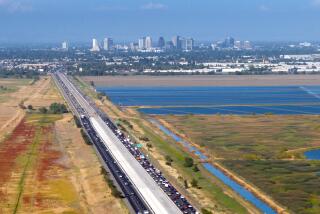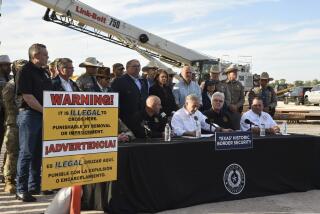Feeling the Need for Speed, Texas Raises Its Limit to 80
- Share via
AUSTIN, Texas — Not only is everything bigger in Texas, it’s becoming faster, too.
This week, if all goes according to plan, the posted speed limit on more than 500 miles of West Texas interstates will rise to 80 miles per hour. That will make Texas home to the highest posted limit anywhere in the United States and one that will rival the recommended maximums on Germany’s famous autobahns.
The Texas Legislature fast-tracked the increased speed limit last year and unanimously recommended it; then the Texas Department of Transportation followed suit with feasibility studies that gave the green light. The Texas Transportation Commission gave its approval Thursday.
The first new speed limit signs went up along two flat, rural stretches of Interstates 10 and 20 just in time for Memorial Day, the traditional start of the summer driving season.
Texans brush aside such concerns as fuel efficiency or the cost of gasoline.
Engineers calculate that drivers burn 7% more gas per mile for every 5-mph increase in speed above 60 mph. Texans calculate that their Hummers need bigger gas tanks.
“Our mission is to go and seek out whether we can fulfill the requests of the driving public,” said Mark Cross, spokesman for the state transportation department. “And the request from the public is they want to go faster.”
Texas and 11 other states permit drivers on some highways to travel up to 75 mph, according to the Insurance Institute for Highway Safety. But Texas transportation engineers determined that 85% of drivers on the two segments of I-10 and I-20 were averaging 80 mph, 5 mph above the current 75-mph speed limit, so officials reasoned that raising the limit would simply be a bow to reality.
“We feel it’s always safer to have motorists traveling at a more uniform speed,” Cross said.
It turns out that 85% is something of a magic number in traffic engineering circles: The speed at which 85% of drivers are traveling, regardless of the posted speed limit, is considered to be the optimum “natural” speed for any given stretch of roadway. The assumption is that a majority of drivers, if left to their own speedometers, will collectively achieve a safe operating speed, and that speed should be the primary factor in setting the legal limit.
This is not, however, a particularly popular notion among traffic safety experts.
“Can you imagine if doctors used that logic for setting what your recommended weight should be?” asked Richard Retting, senior transportation engineer at the Insurance Institute for Highway Safety. “We would all be morbidly obese.”
Retting said the number and severity of accidents would increase with the speed limit at 80 mph. The only question is by how much, he added.
“The idea that higher speed limits will make the roads safer cannot possibly be true,” Retting said. “There’s no mathematical formula that will say precisely what will happen, but it’s clear that speed has a major impact on the number of crashes and the severity of injuries. Invariably, the increases in fatalities range from 15[%] to 40%, depending on how much the speed limit is raised and the characteristics of the roadway. That’s an outcome that politicians need to be honest about with the public.”
The Texas Highway Patrol, caught between the desires of the politicians who pay their salaries and the motorists whose welfare they are supposed to protect, have decided to hug the median on the issue.
“We’ll reserve judgment on injuries and accidents,” said Tom Vinger, spokesman for the Texas Department of Public Safety. “But there’s no doubt that people are going to push the envelope. Our concern is this myth that people think they can drive 5 or 10 miles per hour faster than the speed limit. At 80 miles per hour, you have very little margin for error. We are talking about the basic laws of physics here.”
Consumer groups, meanwhile, are chagrined at the fuel-efficiency implications of allowing drivers to travel faster, and the message that Texas is sending the rest of the country at a time of heightened national concern over gas prices and American dependence on Middle Eastern oil.
“This effort flies in the face of what we think is a growing public sentiment for all kinds of socially acceptable ways to limit our use of gasoline,” said Jack Gillis, director of public affairs for the Consumer Federation of America.
The federation is launching a campaign for mandatory fuel-efficiency gauges on dashboards. “That way, when you go 80 miles per hour, you’re going to see the cost right in your face,” Gillis said.
Texas transportation officials say concerns about fuel efficiency or the possibility of increased accidents are not their department.
“I can’t speak to fuel economy,” Cross said. “I’m sure it will have some impact, but it’s not really our department to consider it.... We do not forecast accidents or fatality increases -- that is not something we routinely look at.”
Cross added, however, that transportation officials encouraged drivers to be prudent.
“We hope people will continue to be safe,” he said, “and not take this action to mean that the roads are wide open for unlimited speed limits.”
At least not yet.
More to Read
Sign up for Essential California
The most important California stories and recommendations in your inbox every morning.
You may occasionally receive promotional content from the Los Angeles Times.










